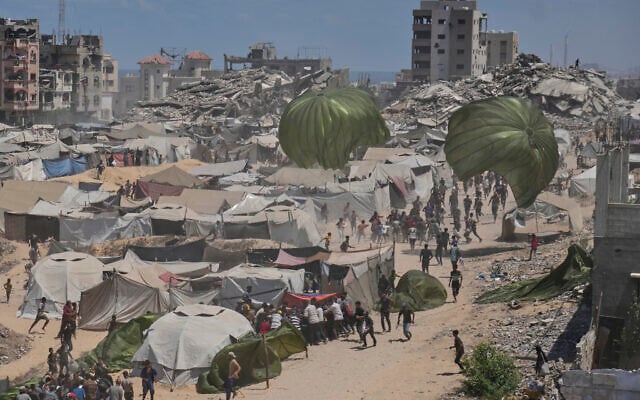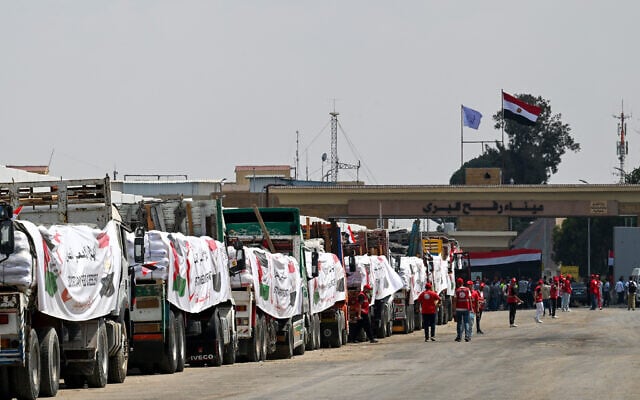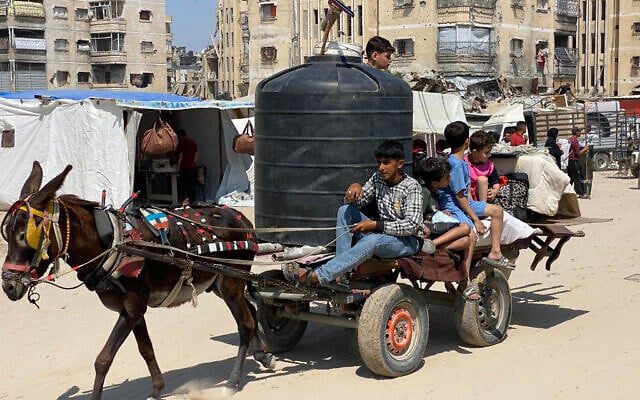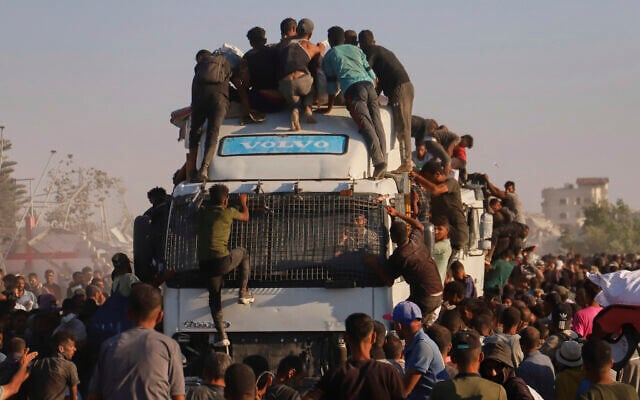



The government and the Israel Defense Forces are currently moving resolutely ahead with plans to conquer Gaza City, with the military having begun the process of calling up 60,000 reservists to participate in or support the new offensive.
As part of the operation, dubbed Gideon’s Chariots B, the IDF intends to evacuate Gaza City of its estimated one million residents and relocate them south of the Netzarim Corridor, between the southern Gazan cities of Khan Younis and Rafah.
Such a complex operation, both to conquer Gaza City and to move such a massive population, will inevitably raise questions about Israel’s legal obligations toward Gaza’s civilian population and the legality of the operation itself.
Under the laws of armed conflict, states may occupy foreign territory, and indeed, it is a common phenomenon of war.
Dr. Eran Shamir Borer, director of the Israel Democracy Institute’s Center for Security and Democracy, notes that an occupation is considered in effect if a territory comes under the “effective control” of a hostile force.
“Effective control,” he explains, means having “boots on the ground” in terms of troops being present in the territory in question, while at the same time, the hostile power must be able to exercise governance over the territory, and the previous government must no longer have that capability.
In March this year, the High Court of Justice ruled that Israel was not an occupying power in Gaza at the time, since it did not have the ability to govern the Strip and because Hamas was still able to exercise its own rule over the Gazan population.
Today, Israel is in control of some 75 percent of Gaza’s territory, but at present, most of the territory it holds includes almost no Palestinian civilians. Most civilians are instead concentrated in the Muwasi humanitarian zone in the south, in Gaza City in the north and the Deir al-Balah governorate in the center.
Shamir Borer says that even today, Israel could argue it is not in occupation of those areas since Hamas still exercises effective governmental control over the population centers, and controls aspects of civilian life there.
He noted, however, that other legal arguments hold that since Israel controls so much of Gaza’s territory, as well as all entry and exit points to and from the Strip, Israel is in effect an occupying power in Gaza.
Writing for the legal blog Just Security, Prof. Eliav Lieblich of Tel Aviv University’s Faculty of Law said of the cabinet resolution to occupy all of Gaza that “claiming that one can ‘take over’ territory – or achieve ‘operational control’ over it – without occupying it, is nonsense.”
He also noted that Netanyahu has repeatedly stated that part of the planned operation is to remove Hamas from power, but pointed out that in so doing, Israel would in effect be fulfilling the conditions of a belligerent occupation.
The issue of whether an occupation has been established in a legal sense is critical, because if a power is considered to be occupying a territory, its legal responsibilities to the civilian population under its control are much greater than its obligations to that population simply as a warring party.
In an occupation, the occupying power has a legal duty to provide for the civilian population under its control and ensure security and public order.
For Israel in its current war, this would include being legally responsible for providing food, water, shelter, medical services, and other critical needs of the Gazan civilian population.
That compares to the legal obligations when there is no belligerent occupation, when a warring party is only obligated to facilitate the provision of food and medical supplies to a civilian population, and does not hold ultimate responsibility for its supply.
Under the Fourth Geneva Convention, to which Israel is signatory, free passage of all medical supplies must be allowed into territory under its control, although the treaty states that the facilitation of food is only obligatory for children under 15, expectant mothers and “maternity cases.”
But Article 70 of the Additional Protocol I of the convention, to which Israel is not a party, is broadly seen as requiring the provision of food to all civilians.
Shamir Borer points out that although Israel is not a signatory to Additional Protocol I, it has, in court proceedings, indicated that it regards the core aspect of Article 70 as reflecting International Customary Law, a body of law arising from “general practice accepted as law” and norms of international law.
Israeli military officials and cabinet ministers have been careful not to describe the pending operation against Gaza City as a plan to “occupy” it, using instead the phrase “take control,” likely due to the legal consequences of a formal occupation.
Attorney General Gali Baharav-Miara pointed out this issue when the cabinet took the decision on August 8 to conquer the entire Gaza Strip, telling Netanyahu that this would make Israel responsible for the needs of the entire territory. The prime minister, in response, told the attorney general the intention was to merely “take control” of the territory, not “occupy” it.
Lieblich, in his article, alleged that Netanyahu’s use of the term “take control” is designed specifically to establish “an occupation of the maximum possible territory with the minimum possible civilians.”
But the absence of civilians from the territory Israel takes control of would be a result of Israel’s actions in order to claim that there is no occupation to begin with,” he asserted.
“While this is a non-starter legally, it is part of a wider political discourse of denying any responsibility for the welfare of Gaza’s civilians,” wrote Lieblich.
Israel intends to evacuate Gaza City’s civilian population, which would help reduce civilian casualties during the subsequent offensive there, and would also bolster claims it is not occupying the civilian population and therefore does not bear the legal responsibilities arising from such a situation.
But there would nevertheless exist a legal obligation for Israel not to create a situation of dire humanitarian conditions in which some one million people are left without adequate provisions for food, sanitation, and medicine, Shamir-Borer said.
“There is an obligation to facilitate the provision of aid. if you’re moving [Gazans] somewhere where they can’t get aid, then you may be violating those laws,” he asserted.
“Israel would be exposing itself to accusations already out there that it is deliberately creating dire humanitarian conditions.”
These accusations have taken on additional weight in light of comments by senior Israeli cabinet ministers in recent months of an intention to create difficult humanitarian conditions to compel Gazans to emigrate.
Doing so would likely constitute forced displacement.
In May this year, leader of the far-right Religious Zionism party and Finance Minister Bezalel Smotrich said that it was the government’s intention to “concentrate” the Gazan population in the south of the Strip where they would be confined to a “humanitarian” zone.
“They will be totally despairing, understanding that there is no hope and nothing to look for in Gaza, and will be looking for relocation to begin a new life in other places,” Smotrich said at the time.
Prime Minister Benjamin Netanyahu has reportedly made similar comments regarding the destruction of Gaza’s housing stock by the IDF during operations, saying in a closed door session of the Knesset Foreign Affairs and Defense Committee — according to media reports — “We are destroying more and more houses, they [Gazans] don’t have anywhere to return to,” and adding, “The only expected result will be a desire for Gazans to emigrate outside the Strip.”
Publicly, at least, Netanyahu has said that moving the population to the south will be carried out for the safety and protection of Gazan civilians, which the Fourth Geneva Convention permits.
It appears that Israel is making some effort to avoid a situation in which it deepens the humanitarian crisis in Gaza if and when it evacuates Gaza City’s civilian population.
The provision of tents and shelter equipment to Gaza was renewed at the beginning of this week, “as part of the IDF’s preparations to move the population from combat zones to the southern Gaza Strip for their protection.”
Such items have not been allowed into the Strip for the last 26 weeks,
And Israeli liaisons to Gaza began telling medical officials and aid groups in the northern part of the Strip this week “to prepare for the population’s movement to the southern Gaza Strip,” including transferring medical equipment to that region.
The provision of aid to Gaza has also been ramped up in the last two months, although it remains well below the levels of aid allowed in during 2024, with the UN and aid agencies insisting that the humanitarian situation in the territory remains dire.
The UN Office for the Coordination of Humanitarian Affairs said on Wednesday that to cope with the current shelter needs of the Gazan population would require the entry of some 3,500 truckloads of tents, tarpaulins and basic household items, without factoring in further displacement from Gaza City.
OCHA also said that the plan to conquer Gaza City “will have a horrific humanitarian impact on people already exhausted, malnourished, bereaved, displaced, and deprived of basics needed for survival.”
It warned the operation was “a recipe for further disaster,” and said it could also amount to “forcible transfer.”
Israel’s Coordinator of Government Activities in the Territories (COGAT) has pushed back against these claims, publishing on Thursday images and videos of food being prepared and distributed in Gaza.
COGAT head Maj. Gen. Ghassan Alian accused the UN on Thursday of making “unfounded claims about hunger in Gaza,” and said Israel was working to “facilitate the entry of massive quantities of food, medicine, and humanitarian aid.”
“Instead of issuing statements and publishing political and distorted reports, the UN and international organizations should direct their efforts toward real assistance for the residents, and not be dragged into false narratives that serve terrorism,” said Alian.





